Tom's Guide Verdict
Assassin's Creed Odyssey has everything it needs to be bigger and better than Origins. But in practice, it's mostly just bigger.
Pros
- +
Varied, fun gameplay
- +
Lots of famous historical characters
- +
Narrative choices and customization
Cons
- -
Disjointed story
- -
Some underdeveloped mechanics
- -
Potentially game-breaking bugs
Why you can trust Tom's Guide
After a few unambitious entries, Assassin's Creed Origins revamped the franchise's combat, stripped out a lot of excess features and returned to the free-form feeling of earlier games. The title earned accolades from fans and critics alike. But Origins raised a question: Would Ubisoft continue to innovate and refine, or would Origins simply be the new template going forward?
If Assassin's Creed Odyssey is any indication, the answer is "a little bit of both."
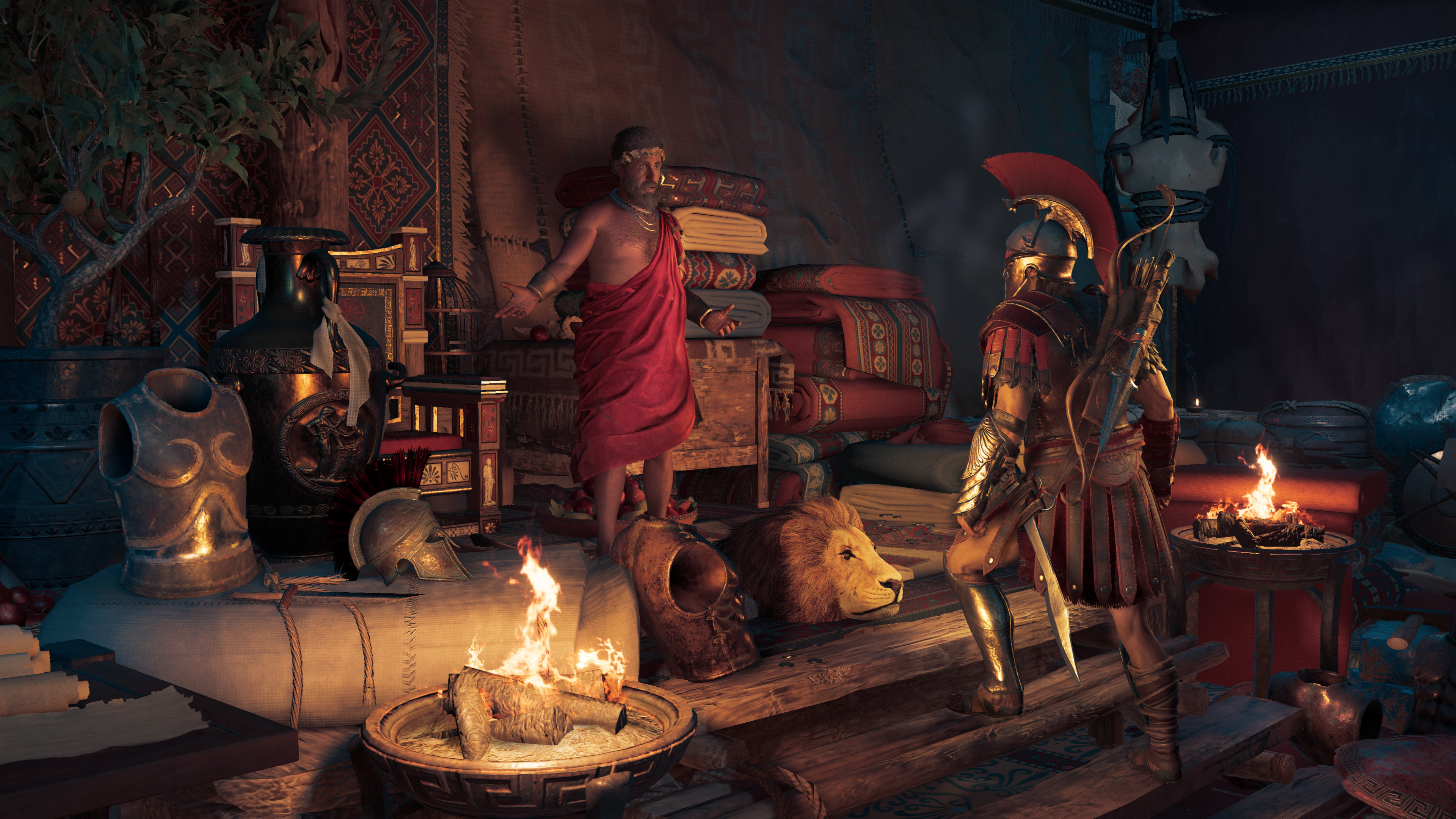
Odyssey winds the clock back to 431 B.C.E. and casts players as a Spartan mercenary during the tumultuous Peloponnesian War. Exploring the enormous ancient Greek world is a delight. Fighting feels tighter and more challenging than before. Naval combat makes a triumphant return.
In theory, Odyssey has everything it needs to be bigger and better than its predecessor — but in practice, it's mostly just bigger. The new gameplay systems feel underdeveloped, while the disjointed story makes exploration a more haphazard affair. Tweaking the game's balance also played havoc with this title's difficulty curve. While there's nothing wrong with Odyssey's moment-to-moment gameplay, a lot of it just doesn't flow or delight in the same way that Origins did.
To be fair, there's still a great core game underneath the padding. But like Odysseus journeying for 10 years before reaching his beloved Ithaca, finding this promised land can sometimes be difficult.
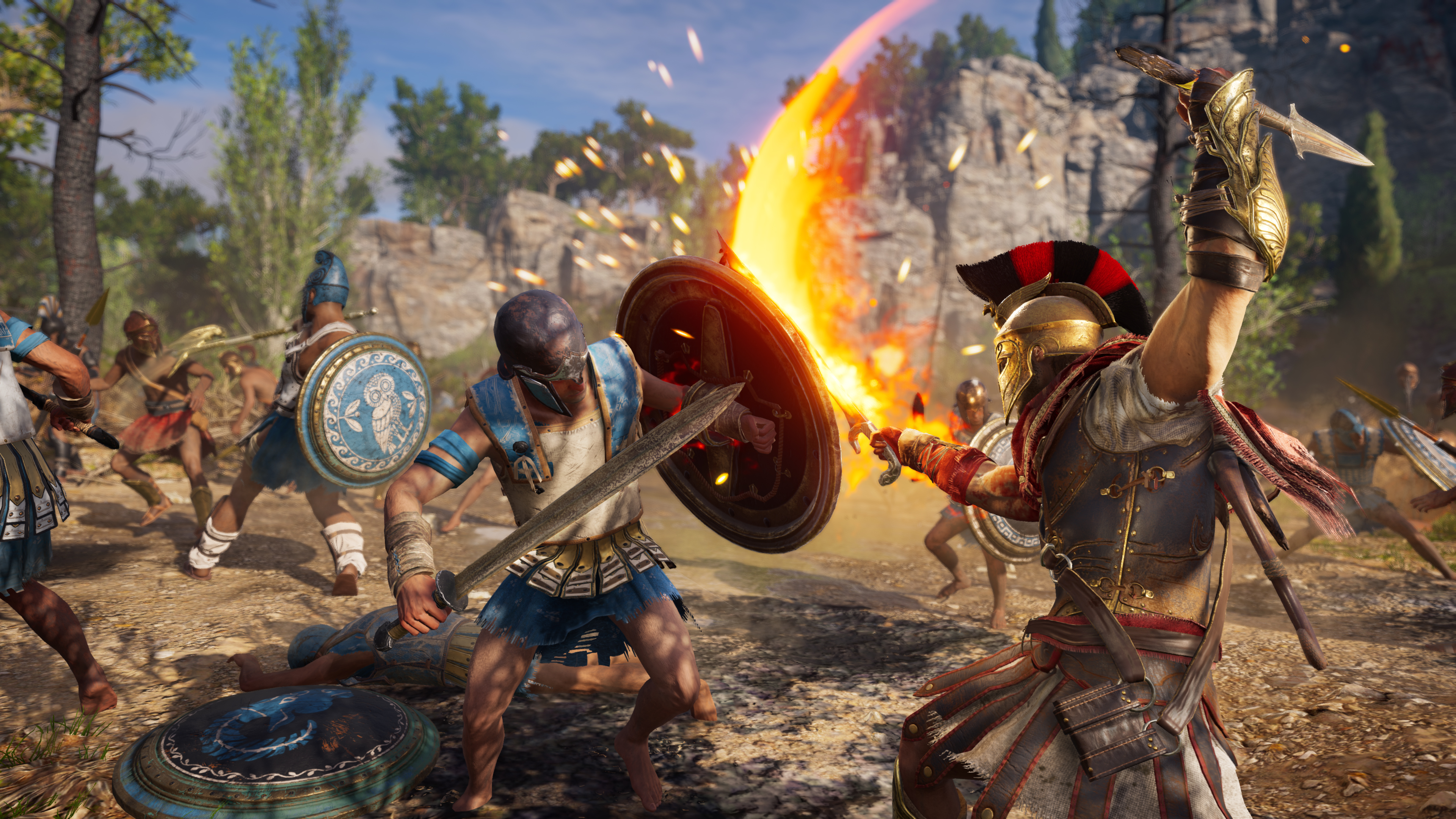
Assassin's Creed Odyssey review: Fight in the shade
Right off the bat, Assassin's Creed Odyssey tries something new by giving players a choice of main character: Alexios or Kassandra. (I picked Alexios, so I'll reference him throughout the piece.) The protagonists are identical from a gameplay standpoint, and nearly so from a story standpoint, so the choice mostly comes down to whether you want to play as a man or a woman. It's not like Syndicate, where you could switch between Jacob and Evie at will; once you've made your choice, that's it.
In fact, just about everything in the game has an element of choice. Like its predecessors, Assassin's Creed Odyssey is a stealth/action game with three primary gameplay pillars: combat, stealth and exploration. Just about everything you do in-game — from defeating enemies, to exploring new enemies, to completing quests — gives you experience points.
Get instant access to breaking news, the hottest reviews, great deals and helpful tips.
As you level up, you can invest these points in ranged combat, melee combat and stealth abilities. Because you can mix and match any of the three skill trees, the way you play is really up to you. As you go, you'll also amass an Athenian treasury's worth of weapons and armor, which change your character's appearance and performance.
That's a good thing, because the gameplay is solid and offers a lot of valid approaches. Playing stealthily is as easy as crouching down and finding cover, but you can buy new skills that increase your assassination damage, reduce the amount of noise you make and cover your weapons in poison.
Sneaking your way through an entire base, taking out enemies one by one before leaping off a zip line to assassinate the polemarch in one fell swoop is just as satisfying as it sounds. (For the record, your Assassin wields the legendary, upgradeable Spear of Leonidas rather than a hidden blade this time around, but the mechanics are almost identical.)
Open combat is similar to what we saw in Origins: fast-paced, chaotic battles where locking onto enemies and timing your combos correctly are vital for victory. There are two major changes, though, and both of them help make combat feel much more dynamic. First off, you no longer get a shield, which is fine; assassins should be lithe and evasive, not like regular soldiers.
The second change is that you now have a variety of active, special abilities at your disposal. As you build up a yellow meter below your health, you can break enemies' shields, set your weapons on fire, instantaneously recover your health or (this is my personal favorite) Spartan-kick people, Leonidas style, over the nearest cliff or ship railing. You can build your meter only by attacking, so the constant push and pull between staying alive and dishing out damage keeps battles interesting.
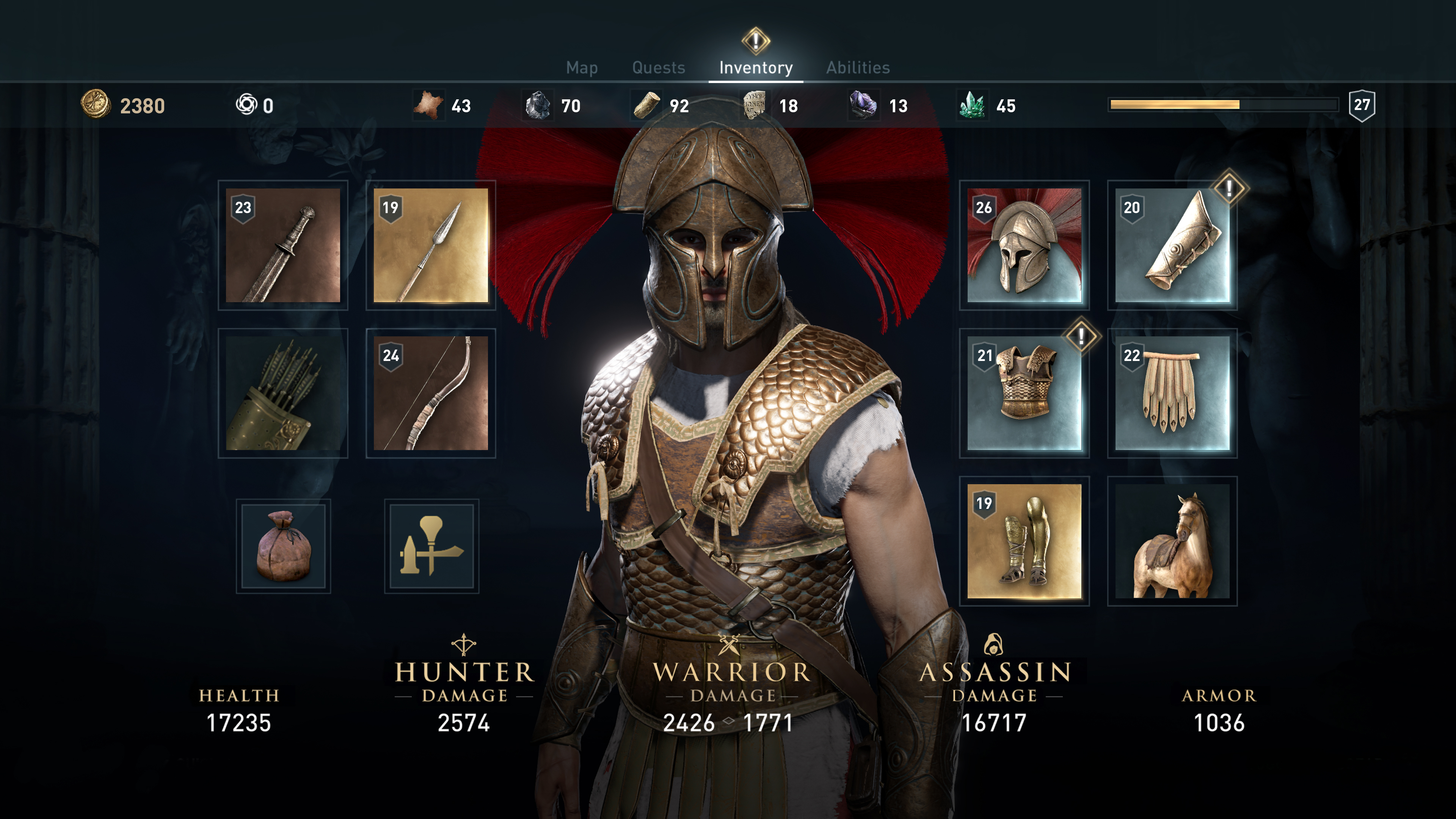
Assassin's Creed Odyssey review: Upping the difficulty
The trouble with Odyssey's combat, though, is that no matter how far you get in the game, it always feels a little same-y. That's because unlike in Origins, the entire world levels up along with you. If you explore a new area, meticulously undertake every side quest, fine-tune your abilities and equip yourself with the very best gear you can find, you'll find your quest to be, at best, only slightly easier than if you had just rushed in headfirst.
Furthermore, enemies near your level can often withstand even the most devastating assassination attempt. There are always going to be numerical abstractions in games with RPG mechanics. But something just feels wrong about stalking an enemy for minutes, finding the perfect isolated spot, sneaking up behind him or her, using your most powerful assassination skill to stick a spear clear through his chest — and then having your foe turn around, with half of his or her health still intact and ready to fight. You simply can't get through this game without a fair amount of open combat.
Like the level-scaling, other additions in Odyssey have questionable effects on gameplay. As you kill enemies, you'll attract the attention of procedurally generated mercenaries, who will hound you across the Greek world. You can even track their locations in a menu and get gameplay rewards as you defeat them.
It's a little like the Nemesis system in Middle-earth: Shadow of Mordor, but not nearly as satisfying. For one thing, the mercenaries don't have any unique dialogue or abilities; they have different weapons and names, and that's about it. Furthermore, they reset over time, so there's no way to track which ones you've killed and which ones are coming to get you. It's impossible to feel a connection with any of them.
Reducing the bounty on your head is tedious, but if you don't do it, you could find mercenaries attacking you in the middle of a boss fight. The first time this happens, it's exhilarating; the 20th time, it's exhausting.
Likewise, Conquest Battles are a new mechanic. As the Peloponnesian War rages on, Athens and Sparta compete for every territory in Greece. By burning supplies, assassinating political leaders and killing soldiers, you can spark a Conquest Battle. Here, Alexios can side with either the defending nation (easier) or the attacking nation (harder) in a huge, open battle to determine who controls a given territory.
The problems here are twofold. First, the rewards are meager: a few pieces of epic equipment, which are also easy enough to come by through regular quests.
Second, it's hypocritical, given the nature of the story. Alexios rightly decries the villains, who play both sides and want to prolong the war indefinitely for their own ends. Fair enough — that's a valid criticism. But then he turns around and pits both sides against each other over and over, basically just to earn a shiny new sword. Yes, he's a mercenary, but this particular bit of greed seems hard to justify. (Plus, it gets repetitive after a while.)
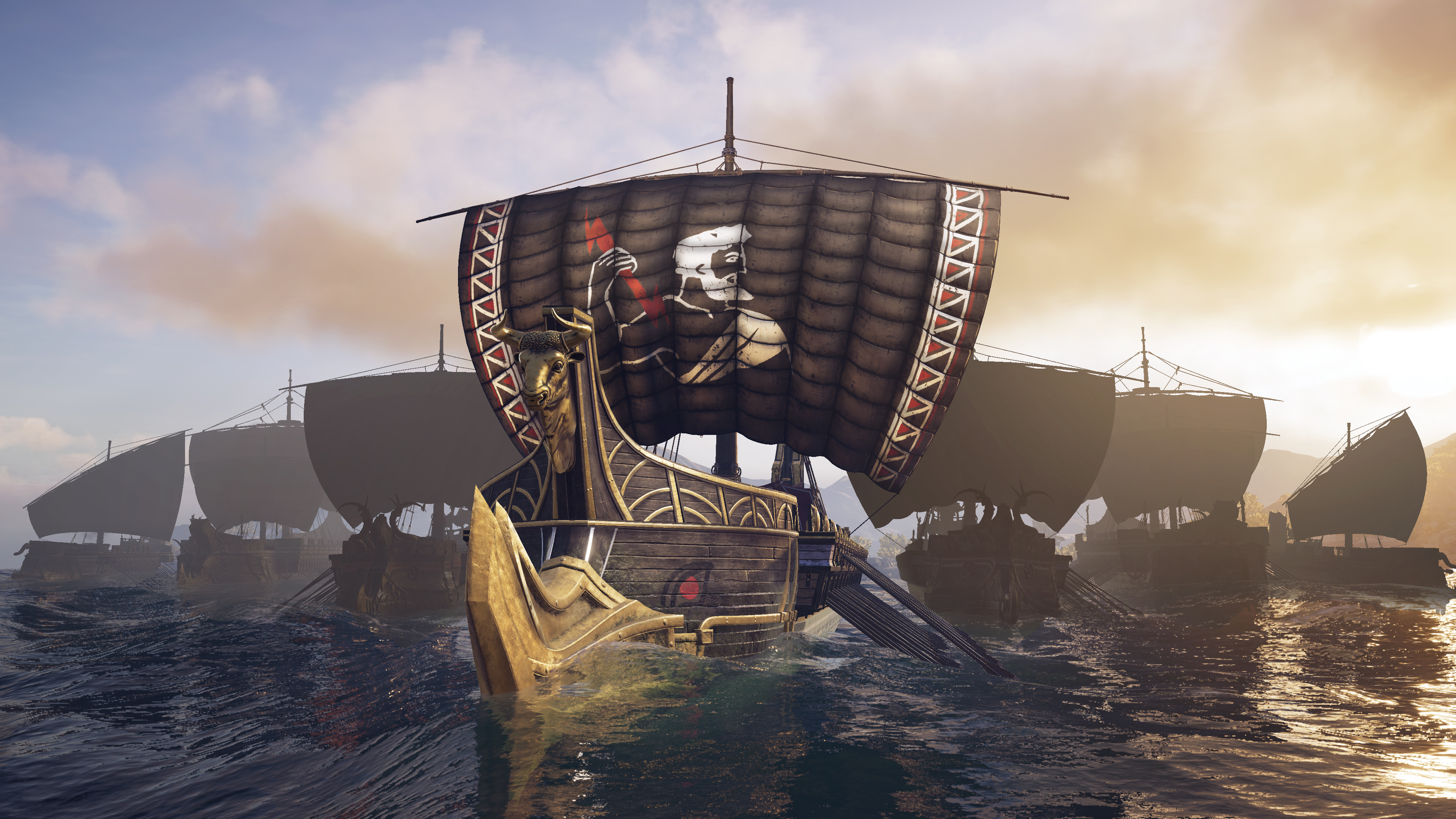
Assassin's Creed Odyssey review: On the high seas
One area where the game excels is exploration. Odyssey's Greece is huge, from mainland locations like Laconia and Attica, all the way out to remote islands like Mykonos and Lesbos. In fact, the overworld in Assassin's Creed Odyssey positively dwarfs the one in Assassin's Creed Origins, particularly once you take sea travel into account.
This isn't entirely a good thing, though. Because the world is so enormous, it's not always clear which area you need to explore next or how you should get there. Likewise, because of the game's level-scaling, there's no sense of urgency or progression as you explore. Your two choices are to get bogged down in every side activity you come across or zip your way through the main plot. The former means you'll spend hours and hours doing nothing to advance the story, while the latter means you'll miss out on a lot of interesting content.
At least you get your own ship, the Adrestia, to travel among the Greek islands. Naval combat doesn't play as central a role in Odyssey as it did back in Assassin's Creed IV, but it's still a ton of fun. You can fire arrows, hurl javelins and ram enemy ships, and as you upgrade your vessel, you can light things on fire. A naval combat mission every few hours helps liven things up, and the upgrades are just difficult enough to earn that they feel worthwhile.
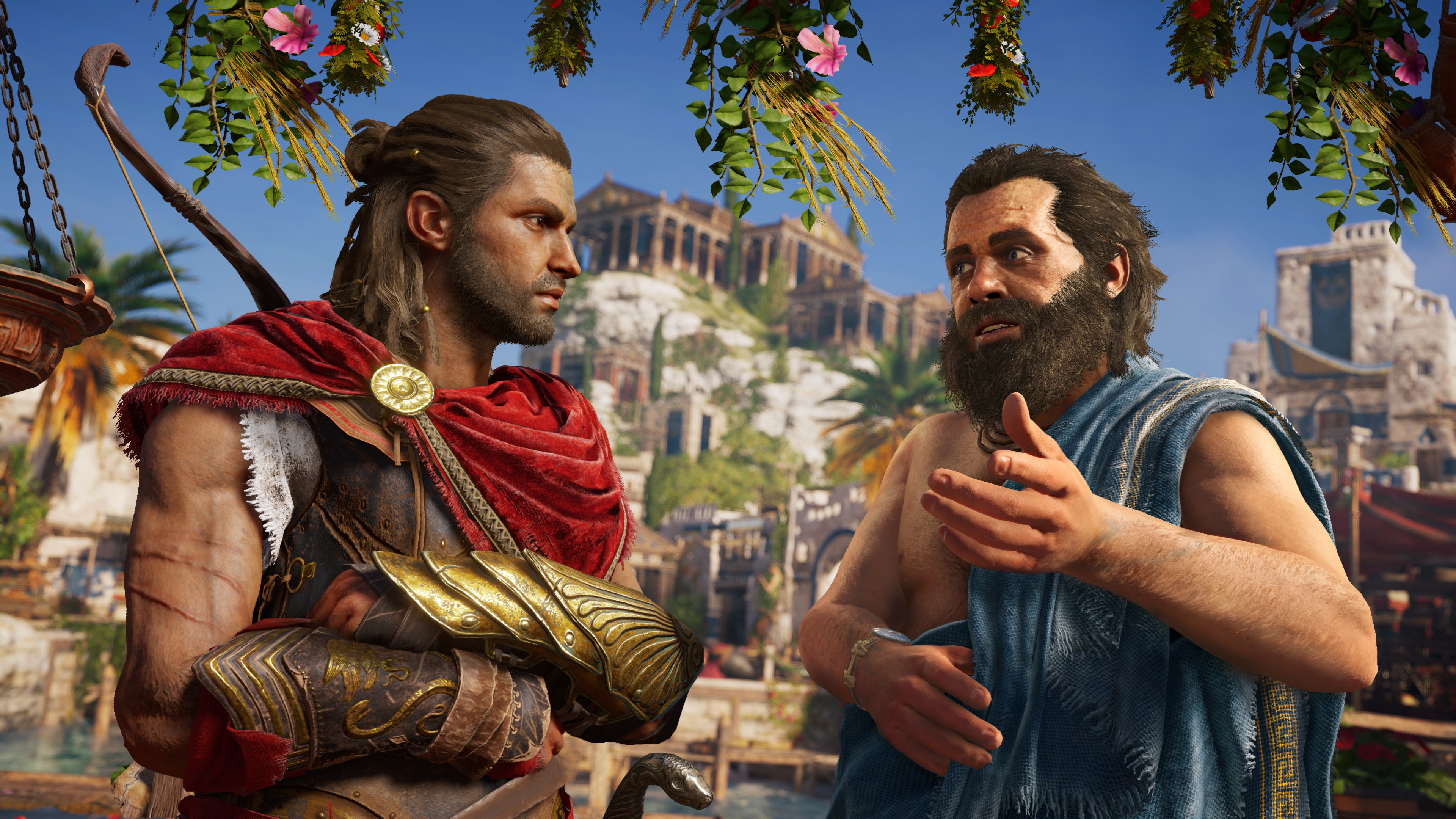
Assassin's Creed Odyssey review: Greek drama
The year is 431 B.C.E., and Athens and Sparta are about to come to blows for control of the ancient world. That means that you, as a misthios, have an opportunity to break free from your humdrum life on Cephalonia and make some money on the mainland.
But your past — as the son or daughter of a prominent Spartan house — comes back to haunt you. Your weapon of choice, the enchanted Spear of Leonidas, has ties to a mysterious First Civilization, a people who walked the Earth like gods, and it's time to discover how your family history, the Peloponnesian War and the First Civilization all fit together.
If you think that sounds like a lot of ground to cover for a single Assassin's Creed game, then you're not wrong. Early on in the game, you'll discover three discrete narratives: a family story, a political story and a First Civilization story.
These story lines intersect occasionally, but it's more accurate to say that they compete. Each one demands Alexios' attention, and it's usually unclear which narrative is supposed to take precedence. Is it more pressing to help rebels on Mykonos or investigate your lineage? Should you upgrade the Spear of Leonidas and reveal its mysteries or hunt down ancient artifacts that could reveal a hidden secret of the Ancient World?
Assassin's Creed Odyssey seems to think that you'll get around to all of this eventually — and perhaps it's right — but after 36 hours with the game, I'm still not sure which is the "main" plot and which narratives simply advance Alexios' personal story.
And the story will get very personal, because in a series-first, you can now choose your own dialogue responses during cutscenes. This can help shape your character or have major impacts on the story, including who lives and who dies. You can choose different quest rewards or romance a handful of potential partners. It's not as deep as a full-fledged RPG, but the customizability is a nice touch.
There's one more tangle in the plot knot. At a certain point in the game, you'll encounter a deadly cult and set out on a long-term quest to assassinate the group's key members. That's fine; that's how Assassin's Creed games normally work. But this time around, you can't just advance the story and wait for the cultists to reveal themselves. Instead, you have to hunt down minor cultists, all around the world, finding clues about their masters.
In theory, this provides an organic way for you to find out the game's secrets for yourself, rather than have them handed to you. But in practice, it's confusing, disjointed and tedious. Rather than a dozen or so targets, you'll now have more than 40, and very few of them get any kind of personality beyond basic, broad strokes. It boils down to a lot of fast traveling around the world, killing someone, finding a clue and repeating the process.
And it doesn't always work as intended. I was standing around, minding my own business in Athens, and I happened to be standing next to one of the most powerful cultists in the game. She attacked me without provocation, and I defeated her — before I'd uncovered any of her servants. And the quest still made me hunt down all of her subordinates before I could turn it in.
On the bright side, though, Ubisoft crammed just about every notable Greek figure who was alive during this time into the game. You'll cross paths with Socrates, Thrasymachus, Alcibiades, Pericles, Aspasia, Cleon, Demosthenes, Anaxagoras, Euripides, Sophocles, Aristophanes, Brasidas and more. Encountering real-life historical figures is one of the joys of Assassin's Creed, and there are plenty of these individuals here.
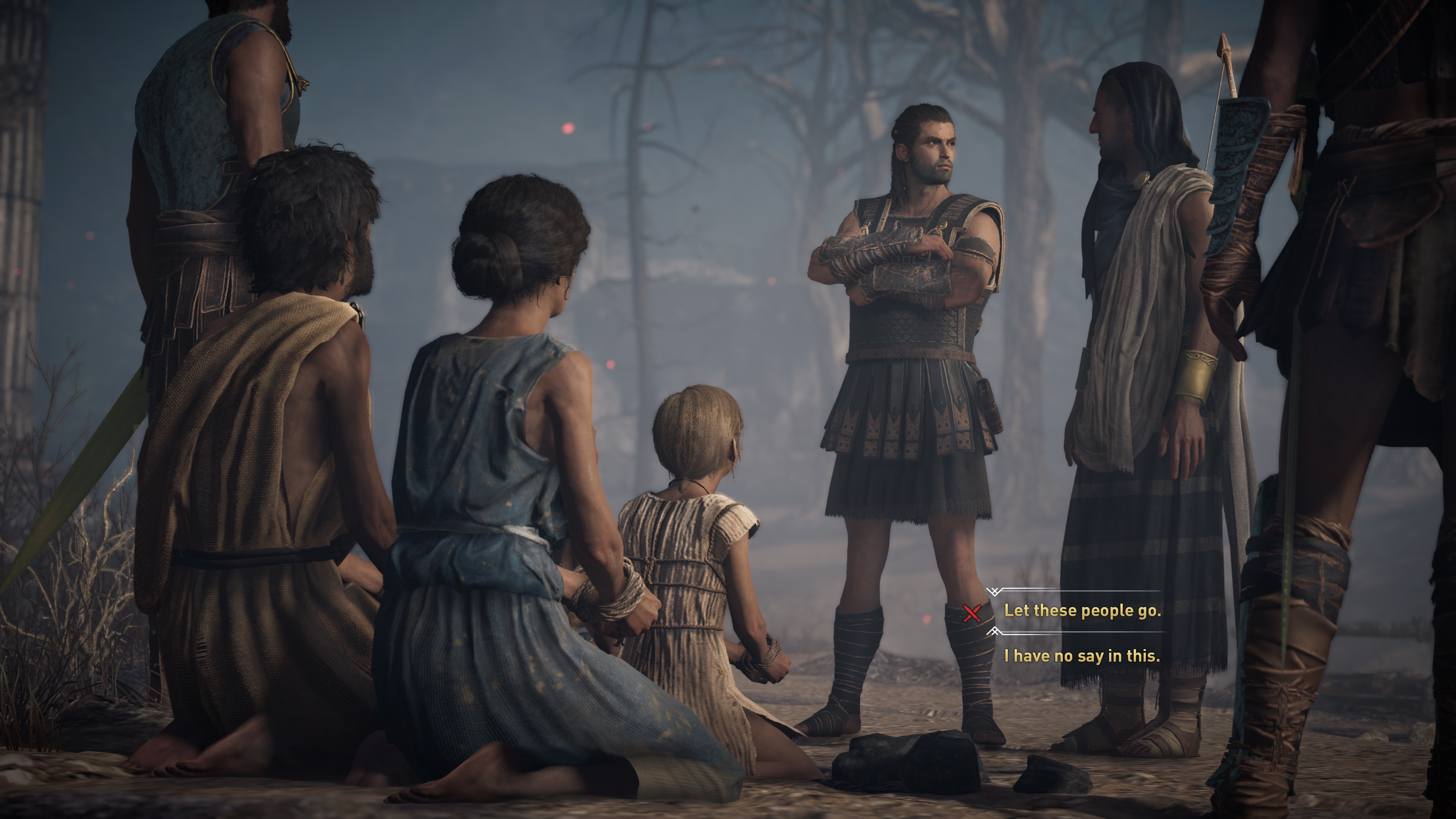
Assassin's Creed Odyssey review: Aegean aesthetics
Like Origins, Assassin's Creed Odyssey looks and sounds great — as long as it's running properly. I reviewed the game on a regular PS4 on a 1080p TV and loved exploring the lush Greek mountainsides and wine-dark seas. The terrain this time around is very hilly, and there's a lot of wilderness (like in Assassin's Creed III), which sometimes makes platforming difficult. But the trade-off is that we get a varied landscape with a lot more greens, blues and reds than last time around.
The music is also up to par, with plenty of bouzouki and chimes. (A lot of the soundtrack has a distinct Age of Empires feel to it, which is always a plus in my book.) Voice acting for Alexios and Kassandra comes courtesy of Michael Antonakos (Warcraft) and Melissanthi Mahut (In Transit), who both infuse their characters with intensity, drama and just the right amount of wry humor. (Bonus points: Both are actually from Greece.)
My only issue with the game's production values is in its performance. The game has long load times and can lag tremendously, especially in big cities like Athens. It's not uncommon for your character (or your ship) to freeze for up to 10 seconds at a time, then move a bit, then freeze again until the system finishes rendering the area.
The game froze up on me completely at least once; another time, I encountered a game-breaking bug in a vital plot mission, because I had missed an encounter with an important character. If I'd lacked a save to reload, I would have been out of luck; there is no easy way to restart missions in progress.
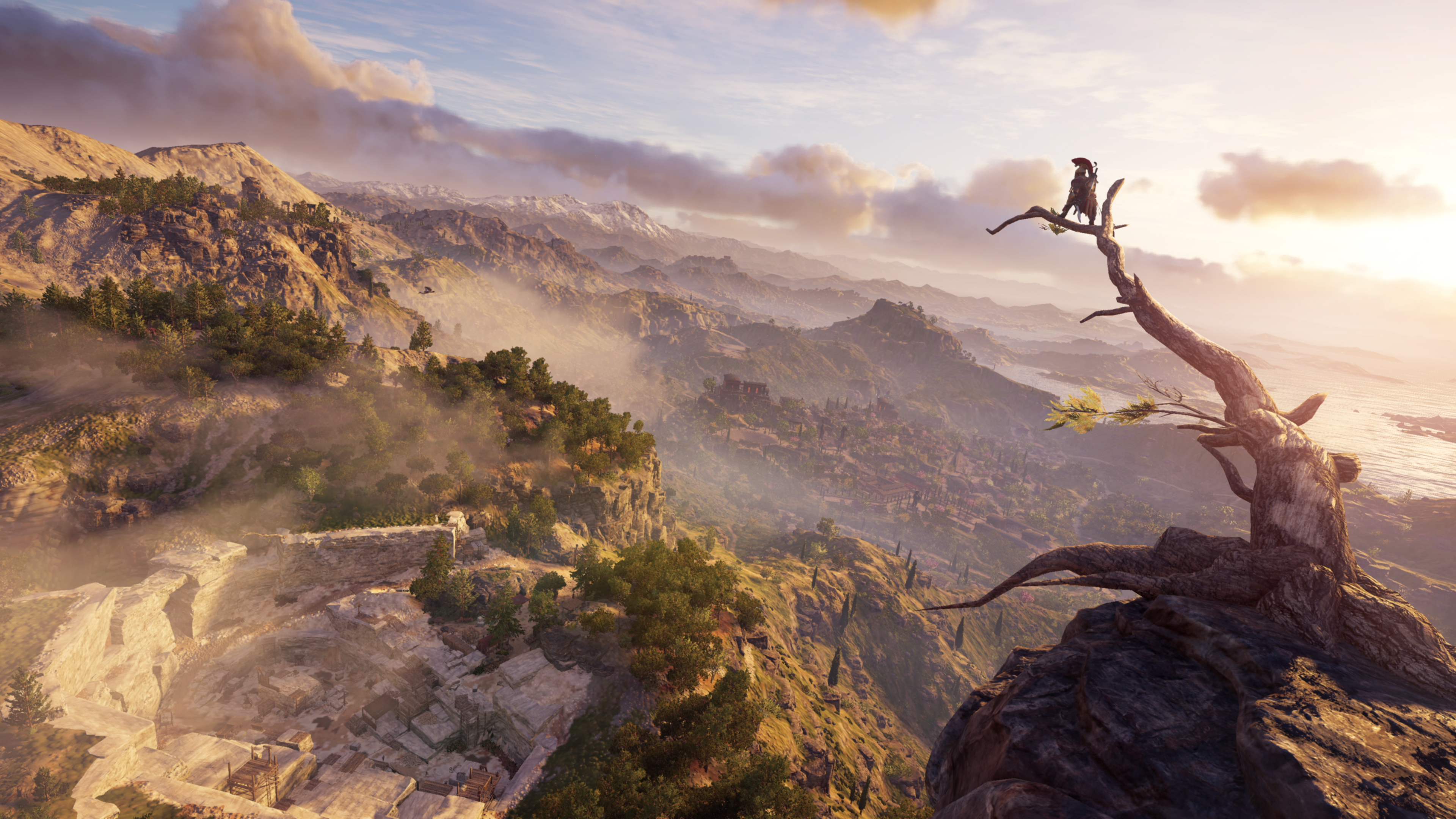
Assassin's Creed Odyssey review: Verdict
I like Assassin's Creed Odyssey, and I appreciate that all of its shortcomings came from a place of ambition. The series has never had a bigger, more detailed, more customizable game. But its size can feel daunting, its plot can feel confusing, and its open-endedness can feel aimless. What Odyssey has gained in scope, it's lost in focus.
Still, there's no denying that there is a meaty, well-made game at the center of all this, complete with just about everything that fans have loved about previous entries. Stealth, exploration, even naval combat — it's all here, and it's all more refined than before.
I don't know if Assassin's Creed Odyssey will last throughout the ages, like a Homeric poem. But I do know that it's a pleasant companion for a lazy weeknight, like a moderately priced bottle of Greek wine. If you've already played Origins and its DLC, this is your next logical stop. Στην υγειά σας!

Marshall Honorof was a senior editor for Tom's Guide, overseeing the site's coverage of gaming hardware and software. He comes from a science writing background, having studied paleomammalogy, biological anthropology, and the history of science and technology. After hours, you can find him practicing taekwondo or doing deep dives on classic sci-fi.
